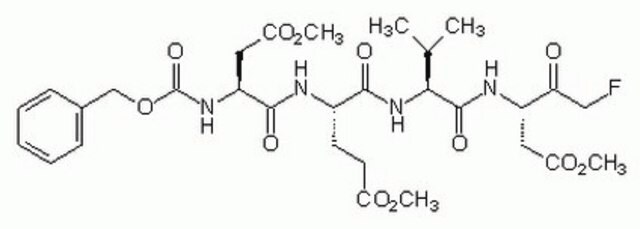05-348
Anti-Tau Antibody, clone 5E2
clone 5E2, Upstate®, from mouse
Se connecterpour consulter vos tarifs contractuels et ceux de votre entreprise/organisme
About This Item
Code UNSPSC :
12352203
eCl@ss :
32160702
Nomenclature NACRES :
NA.41
Produits recommandés
Source biologique
mouse
Niveau de qualité
Forme d'anticorps
purified antibody
Clone
5E2, monoclonal
Espèces réactives
bovine, rat, rabbit, mouse, human
Fabricant/nom de marque
Upstate®
Technique(s)
immunohistochemistry: suitable
western blot: suitable
Isotype
IgG1
Numéro d'accès NCBI
Numéro d'accès UniProt
Conditions d'expédition
dry ice
Modification post-traductionnelle de la cible
unmodified
Spécificité
several parts of Tau protein between 50kDa and 70kDa
Immunogène
Fetal heat stable MAPS
Application
Detect Tau using this Anti-Tau Antibody, clone 5E2 validated for use in WB, IH.
Research Category
Neuroscience
Neuroscience
Research Sub Category
Apoptosis - Additional
Neurodegenerative Diseases
Apoptosis - Additional
Neurodegenerative Diseases
Qualité
routinely evaluated in immunoblot on rat brain preparations
Description de la cible
50-70kDa
Liaison
Replaces: MAB10417
Forme physique
0.1M Tris-glycine, pH 7.4, containing and 0.05% sodium azide
Format: Purified
Protein G Chromatography
Stockage et stabilité
2 years at -20°C
Informations légales
UPSTATE is a registered trademark of Merck KGaA, Darmstadt, Germany
Clause de non-responsabilité
Unless otherwise stated in our catalog or other company documentation accompanying the product(s), our products are intended for research use only and are not to be used for any other purpose, which includes but is not limited to, unauthorized commercial uses, in vitro diagnostic uses, ex vivo or in vivo therapeutic uses or any type of consumption or application to humans or animals.
En option
Réf. du produit
Description
Tarif
Code de la classe de stockage
12 - Non Combustible Liquids
Classe de danger pour l'eau (WGK)
WGK 1
Point d'éclair (°F)
Not applicable
Point d'éclair (°C)
Not applicable
Certificats d'analyse (COA)
Recherchez un Certificats d'analyse (COA) en saisissant le numéro de lot du produit. Les numéros de lot figurent sur l'étiquette du produit après les mots "Lot" ou "Batch".
Déjà en possession de ce produit ?
Retrouvez la documentation relative aux produits que vous avez récemment achetés dans la Bibliothèque de documents.
Gennady Ermak et al.
The FEBS journal, 273(10), 2100-2109 (2006-05-03)
The RCAN1 protein (previously called calcipressin 1 or MCIP1) binds to calcineurin, a serine/threonine phosphatase (PP2B), and inhibits its activity. Here we demonstrate that regulated overexpression of an RCAN1 transgene (this gene was previously called DSCR1 or Adapt78) also stimulates
K S Kosik et al.
Neuron, 1(9), 817-825 (1988-11-01)
Tau protein has been shown to be an integral component of Alzheimer paired helical filaments (PHF). However, the extent to which tau is incorporated into PHF has not been clear because the antibodies used to label PHF generally do not
W R Markesbery et al.
Neurobiology of aging, 14(4), 303-307 (1993-07-01)
Neuropil threads were quantitated in the neuropil (excluding senile plaques) of the superior frontal gyrus of 6 late stage patients with Alzheimer's disease (AD) and 6 age-matched control subjects using tau immunocytochemistry and computerized morphometric image analysis. The mean percent
MAP2 and tau segregate into dendritic and axonal domains after the elaboration of morphologically distinct neurites: an immunocytochemical study of cultured rat cerebrum.
Kosik, K S and Finch, E A
The Journal of Neuroscience, 7, 3142-3153 (1987)
N W Kowall et al.
Annals of neurology, 22(5), 639-643 (1987-11-01)
The microtubule-associated protein tau, a major antigenic component of paired helical filaments, has been demonstrated in neurofibrillary tangles and in neurites of senile plaques. With optimal fixation and histochemical methods, we show the normal axonal location of tau protein in
Notre équipe de scientifiques dispose d'une expérience dans tous les secteurs de la recherche, notamment en sciences de la vie, science des matériaux, synthèse chimique, chromatographie, analyse et dans de nombreux autres domaines..
Contacter notre Service technique







